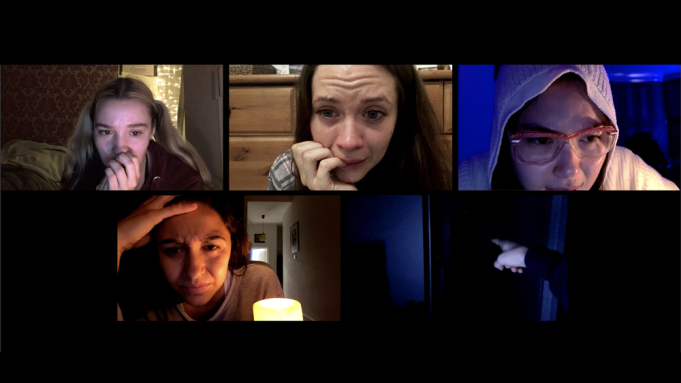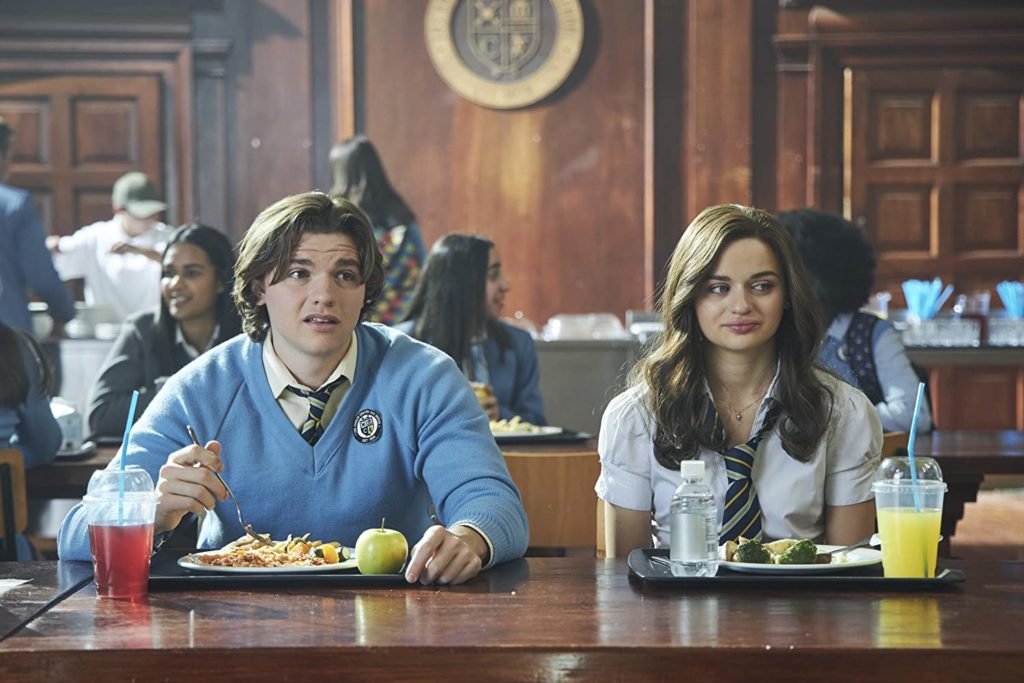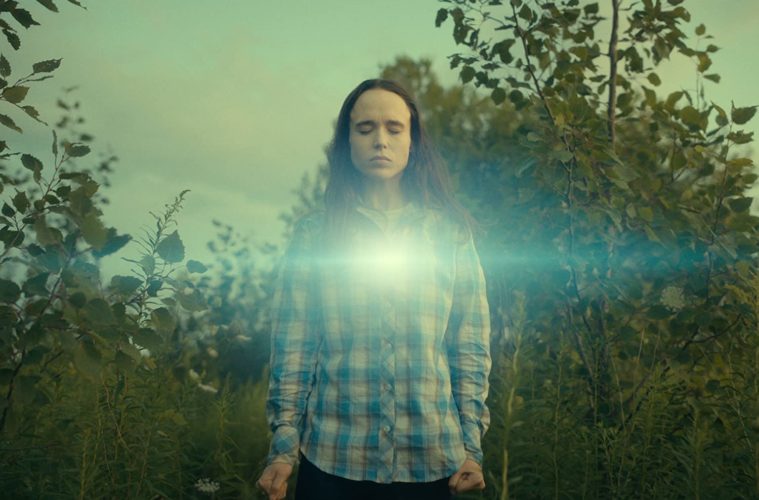There’s a battle brewing, and it’s being fought by streaming services, cable TV and primetime television. If you’re too weak to resist, “UnBinged” is here to help, telling you what to hate, what to love and what to love to hate. This week: Shudder’s Host is new horror for the Zoom generation, while Netflix’s hottest sequels The Umbrella Academy 2 and The Kissing Booth 2 present the best and worst of sequel-dom.
The Umbrella Academy – Season 2 (Netflix)
In 1989, 43 children were born to mothers who earlier in the day were not pregnant. Soon after this miraculous event, eccentric billionaire Reginald Hargreeves adopted seven of the children in an effort to create his own superhero task force. In time, they grew up to be resentful and profoundly dysfunctional people who accidentally destroy the Earth on numerous occasions.
Based on Gerard Way’s comic series, The Umbrella Academy is part of a trend of anti-hero superhero series that includes Amazon Prime’s The Boys and HBO Max’s Doom Patrol, yet it still manages to set itself apart. In The Boys, heroes are marketing ploys, super-powered jerks who play do-gooders to sell products. In Doom Patrol, the rag-tag group includes powered-up fuck-ups trying to find their way in the world, evolving from the selfish or broken beings they were in their former life.
But the members of the Umbrella Academy are different. This is a dysfunctional family adopted by a “man” whose dislike of children didn’t deter his agenda. They are treated like a science experiment, given numbers in lieu of names and lessons instead of affection. Twenty years later, and the effects of such an upbringing created a cluster of scarred adults who don’t know how to love, how to trust, or where they fit into society.
Season 2 kicks off just seconds after the first season ended: on the cusp of world destruction, which not surprisingly, feels very reflective of the times. To avoid the apocalypse, the Umbrella Academy has been scattered throughout time, dropped off in various years during the ’60s in downtown Dallas. Over the next few years, the UA settles into their new situation as they await the arrival of their siblings. Some get married, some go crazy, while others amass followers and find themselves on the cusp of history.
As an audience, we are rooting for these characters to find their happy place. We want them to experience belonging and contentment because we have seen them wear their pain overtly, like the school uniforms they once donned. We want Vanya (Ellen Page) to find love, Diego (David Castañeda) to find acceptance, and perhaps we even want to join Klaus’s (Robert Sheehan) weird ass cult. We even want Alison (Emmy Raver-Lampman) to end up with Luther (Tom Hopper), despite the implication of possible incest which is super icky. (Honestly, at this point, the audience has already accepted a 60-year-old tween with a mannequin wife, so a little incest is easy to overlook.)
The acting in The Umbrella Academy is solid, with Page, Sheehan and Aidan Gallagher as Number Five being the true standouts. Everyone does an admirable job with the complicated material. Sheehan and Gallagher in particular are able to inject humor into every scene they occupy, elevating a story that can get very dark, very quickly. Kate Walsh is also superb as the Handler, a sociopath dressed like a “final four” contestant from RuPaul’s Drag Race.
The story is compelling and manages to remain focused despite the complicated plot. Even if you felt meh about season 1, the follow-up might win you over; it’s better and it feels more believable right now. The second season doesn’t answer all our questions, but it highlights the underlying mystery that propels the show and its characters so we can’t help feel more invested. Who is Hargreeves? What was his reason for adopting these beings? And will there ever be a future where the Academy doesn’t destroy the world? Luckily, Netflix has promised us scores of new seasons to figure this all out.

HOST (Shudder)
Host (Shudder)
Several months into the global crisis, it is safe to say that most folks have become well acquainted with Zoom video chats. As people restrict their movement and are encouraged to stay home, society grows more reliant on technology as a means to connect with others. Host is a movie born to those restrictions, a look at what can happen if that desire to connect leads to something evil.
In Host, a group of twenty-somethings conduct a video seance, thus opening a door to demonic forces. On the surface, Host is yet another found footage film with a premise built on well-used cliches and horror genre tropes. But given the format in which it is presented, this horror film for the COVID-age is able to inject new life into a well-worn concept. And really, for what it is, it ain’t half bad.
The familiar cliches and set-ups we have all seen time and time again engage thanks to the skills of the filmmakers and quality of the acting. But the true uniqueness of Host comes from its setting which we can all relate to right now. The film operates within the same rules that currently confine its audience. Like the main characters, a lot of us are bored from being at home all day and just need new experiences to liven up the monotony.
Host is not a movie that defines a generation nor does it make huge leaps for the genre, but it is a film intended for right now in this exact moment in history. It makes the most of current events and fears, creating a specific niche for itself that works. In a world where face masks are functional fashion and the sound of a cough is enough to stir panic, Host delivers fun scares that are ironically a lovely distraction from the horrors of reality.

THE KISSING BOOTH 2 (Netflix)
The Kissing Booth 2 (Netflix)
Two years ago, The Kissing Booth debuted on Netflix, and was met with bad reviews but great ratings. Chasing the legacy of classic yet convoluted teen comedies like Ten Things I Hate About You and She’s All That with its own unique brand of vapidness, the pic was a resounding success on the streaming service.
Because of this, star Joey King (Elle) called the film “critic proof,” citing its basic themes and ideas, which resound with younger audience members despite older audiences distain. This also seems to be the case with the sequel as The Kissing Booth 2 became one of Netflix’s most-watched original movies.
But to be clear: The Kissing Booth 2 might be “critic proof,” but that doesn’t mean it isn’t bad. And it is bad. The movie’s intended audience is the teen and tween sect, a younger generation who are still unaware that it is not physically possible to ponder the mysteries of the universe while sitting next to the Hollywood sign at night or apply for credit cards at age 17 (all things Elle does within the first five minutes). TKB2 lives in its own world with its own rules, dictated by non-stop exposition by lifeless characters who would flounder in the real world.
In the sequel, protagonist Elle finds herself in a pickle as she must decide which university to attend: UC Berkeley with her bestie Lee (Joel Courtney) or Harvard with her boyfriend (Jacob Elordi)? She also suffers from an onslaught of hunky suitors, as well as pressures from school to create a very non-COVID-minded money-making endeavor that encourages teens to swap spit for cash.
But the main issue with TKB2 isn’t the plot. We have all seen over-reaching plots succeed and even charm audiences. The real issue here are the characters who occupy this world. Elle is both entitled and a doormat who uses people to achieve her own ends while bending like a sapling to the will of others. Luckily for her, there are no consequences in this world and no lessons to be learned. There are no story arcs in which a character can grow and become a better person. If a character starts the journey as an awful human being, then an awful human being they shall remain…but with the opportunity to attend Harvard.
The Kissing Booth 2 is a story in which characters are only driven to make others happy with no emotional growth. For rom-com junkies, this isn’t the worst film, just aggressively mediocre. But for true film fans looking to relieve boredom, it is best to move along. This is an escapist fantasy written by a madman, where convoluted rules dictate the actions of the characters rather than personal choice. Teens may love it, but they don’t know any better yet.
Advertising disclosure: We may receive compensation for some of the links in our stories. Thank you for supporting LA Weekly and our advertisers.

